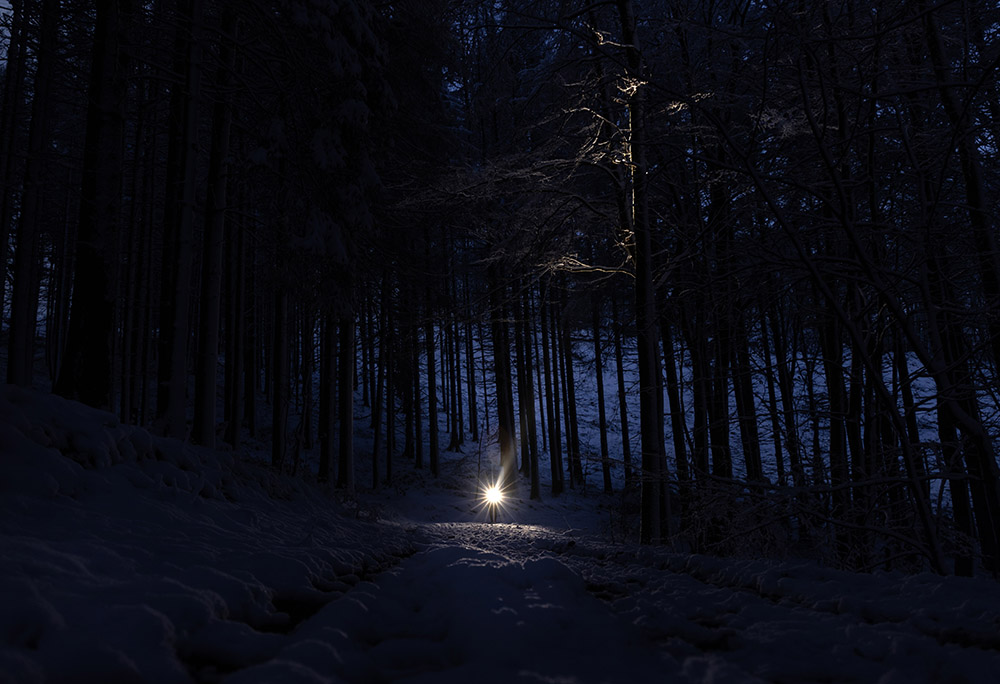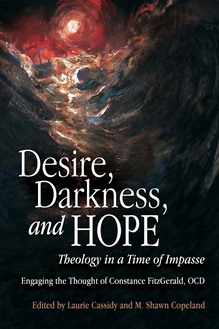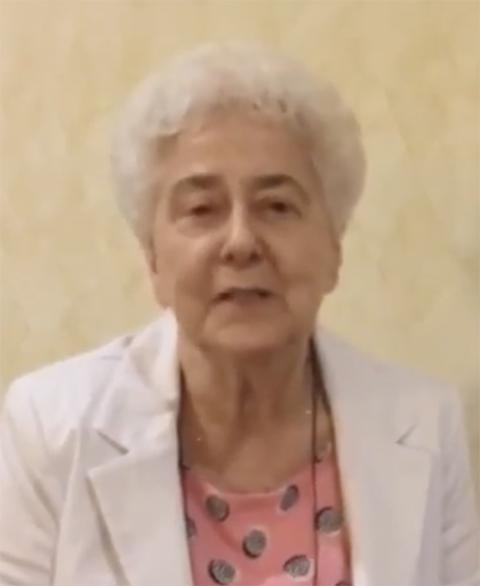
(Unsplash/Tobias Rademacher)

"What if, by chance, our time in evolution is a dark-night time — a time of crisis and transition that must be understood if it is to be part of learning a new vision and harmony for the human species and the planet?... For a new consciousness and harmony?"
These words of Carmelite Sr. Constance FitzGerald are as prescient and prophetic today as they were when she wrote "Impasse and Dark Night" in 1984. FitzGerald has been an inspiration to me and has influenced my own contemplative journey as well as the work of the Institute for Communal Contemplation and Dialogue.
When I heard that a new book, Desire, Darkness, and Hope: Theology in a Time of Impasse, had just been published by Liturgical Press, I quickly bought it and began reading.
Editors Laurie Cassidy and M. Shawn Copeland have done a superb job inviting nine theologians (as well as Cassidy herself) to reflect on FitzGerald's work in light of the impasse we are experiencing today. The genius, I find, is that they decided to include seven of FitzGerald's articles as well.
Having access to her works in one place invites you to get to know FitzGerald or to deepen your friendship with her. She reveals herself not only through her excellent scholarship of St. Teresa of Ávila and St. John of the Cross but through her willingness to be so open as she speaks to the experience of the mystical journey and her deep and passionate love for God.
Her belief that "one's experience of God and of spirituality must emerge from one's concrete, historical situation and must return to that situation to feed it and enliven it" clearly shines through each essay.
The theologians address the connections of FitzGerald's writings regarding impasse and the dark night of the soul with the crises facing us, including white supremacy, patriarchy, climate change, violence and economic exploitation.
Advertisement
Cassidy, in her essay on "Contemplative Prayer and the Impasse of White Supremacy," draws on FitzGerald's approach to societal impasse. Cassidy posits that if those of us who are white can fully acknowledge the religious and theological implications of white supremacy for our faith, it may bring about a form of self-knowledge. This self-knowledge "can create the possibility for genuine change and transformation because we are disposed for God's loving action and passionate desires in the midst of impasse."
But coming to such self-knowledge is the crux of the mystical journey. FitzGerald reflects on how Americans are not educated to face impasse. We don't know what to do with situations that cannot be solved by hard work, rational analysis or well-planned programs. The United States as a dominant nation "dare not let the full import of impasse even come to complete consciousness. It is just too painful and too destructive of national self-esteem."
Coming to grips with one's own and society's limitations and "shadow," and then surrendering them to contemplative prayer is essential if we are to move through this experience of impasse "so that a creative revisioning of our world is possible."
The authors of the essays address how the impasse that we are experiencing is embodied in the injustices of our time and embedded in a culture and worldview that cannot address them adequately. Our usual way of solving problems tied to reason, analysis and planning now limit our thinking and we need to break out of it.

Carmelite Sr. Constance FitzGerald (NCR screenshot/YouTube/NCRonline)
The new vision — paradoxical and complex — does not come on demand but is part of unconscious processes of which contemplative reflection is key. As FitzGerald states, "impasse can be the condition for creative growth and transformation if the experience of impasse is fully appropriated within one's heart and flesh with consciousness and consent."
I agree with FitzGerald's belief that this time of crisis can be a moment for a new awakening. The essays profoundly reflect the interconnection of what contributes to the impasse that we experience societally and personally. The worldwide COVID-19 pandemic has revealed serious systemic inequities imbedded in our economic, political and cultural structures.
Brian N. Massingale's essay, "Toward a Spirituality for Racial Justice: The Transformation of Consciousness and the 'Souls of White Folks,' " explores how the culture of white supremacy underlies and shapes these systems in profound ways.
Drawing on the studies that indicate that racial stereotypes operate at a subconscious level to influence behavior, Massingale posits that white supremacy is a culture that operates below the level of consciousness experienced more as an inchoate feeling or intuitive conviction. "White supremacy describes the nonrational, instinctual, existential, and visceral conviction that this nation — particularly its public spaces and institutions — belongs to white people in a way that it does not and ought not belong to 'others.' "
As a culture — a set of meanings and values that inform a community's life — it socializes people in an unconscious way. Drawing on the work of W.E.B. DuBois, Massingale discusses how it pervades Christianity. DuBois wrote that "the assumption that of all the hues of God whiteness alone is inherently and obviously better than brownness or tan."
Massingale continues: "From this divinely conferred superiority, dominance, and entitlement flow several pernicious consequences. First, a belief that nonwhite lives are expendable. … The second is that the goods, lands, and material wealth of nonwhite people exist for the benefit of white people and can be seized by any means they deem fit. … A third consequence … the lives of fellow whites are expendable if they interfere with or infringe on the right to own, control, and benefit from the goods of the nonwhite world."
Perhaps this is the impasse which we must fully appropriate as we enter the dark night. Too many of us suffer from what Massingale calls the pervasive conditioning that marks the souls of white folks — an interior disease, a malformed consciousness. It enables us to not care for those who don't look like us, withholding sympathy, empathy and concern.
FitzGerald tells us what to do. To bring that impasse — that which imprisons us, individually and societally, and for which there is no rational solution — "to prayer, to the perspective of the God who loves us, that our society will be freed, healed, changed, brought to paradoxical new visions, and freed for nonviolent, selfless, liberating action, freed, therefore, for community on this planet earth."
I believe our capacity to begin to envision new responses and new ways of being is contingent on our willingness to enter into the dark night of our time. We must be willing to face into the worldwide consequences of white supremacy. We must surrender our powerlessness so that we can "see how to be and to act on behalf of God in the world."
FitzGerald believes that as we engage at the deepest levels of contemplative purification, we are being changed radically and are becoming the carriers of the evolution of human consciousness for the rest of humanity.
She writes: "A transformation of consciousness frees the person to place on the currents of human consciousness not violence, greed and hatred, but love, compassion and prophetic hope for a transformed community." She adds that "profound contemplative union — the fullness of Christ consciousness — changes individuals radically. … In them humanity is opened to new possibilities, new vision, a vast unimaginable future."
Here then is a book that is a contemplative journey. It serves as a companion to one's contemplative practice. It invites both personal and societal transformation. It invites us to contemplation.








